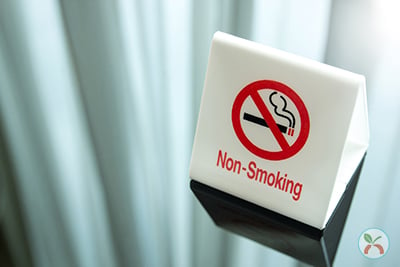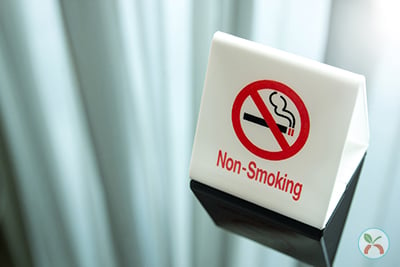In light of the recent news about U-Haul International, Inc. declining job applicants who are nicotine users as of February 1, 2020, you might be thinking, “Is that legal?” Whether you’re administering your own wellness program or have clients with questions, read on to learn more and ensure you make a good decision.

A Look at Federal Laws
Cigarette smoking is a proven cause of preventable disease and death in the United States, according to the Centers for Disease Control and Prevention (CDC). The Americans with Disabilities Act (ADA) may require companies that employ 15 or more people to protect workers from passive smoking, but it does not specifically address smokers’ rights. While there are state laws that protect smokers, U.S. courts have a track record for protecting the rights of non-smokers. No federal law provides a right to smoke. The U.S. Equal Employment Opportunity Commission (EEOC) does not recognize smokers as a protected class. Smoking isn’t considered a disability – at least not yet.
You might be thinking, “It sounds like it’s legal to exclude smokers from the workforce”—but not so fast.
The Actual Answer Is: It Depends
While there isn’t a federal law that expressly protects smokers regarding employment rights, smokers claiming to suffer from nicotine addiction may have an argument that they are disabled and therefore protected from discrimination under the Americans with Disabilities Act Amendments Act (ADAAA), as with alcohol addiction. The Surgeon General’s 2014 report on smoking recognized smoking—nicotine specifically—to be an addictive substance similar to heroin and other illicit drugs. Up to now, however, it has been successfully argued that there is no need to smoke because nicotine can be delivered by alternative methods. Additionally, the ADAAA’s definition of disability includes “mental or physical impairment that substantially limits” a person’s ability to perform at least one “major life activity.”
But here’s where laws get interesting. The ADAAA clearly spells out that people who currently use illegal drugs are not protected under the law. However, if a person is in rehab, they are protected. This could mean that people who use smoking cessation aids such as gums, patches, and perhaps even e-cigarettes are protected—even in states that allow employers to screen out applicants that smoke.
States with “Smokers’ Rights” Laws
Smokers and the tobacco industry have worked to defend smokers’ rights at the employer and state level, with a high degree of success. Currently, 29 states and Washington, D.C. have laws that protect smokers. These laws differ by state; some protect lawful off-duty activities or prohibit discrimination against nicotine users. U-Haul did its homework before announcing its new nicotine-free hiring policy, as it applies only in states which do not have laws in place to protect smokers.
Whether an employer can lawfully decline to hire someone based on their nicotine use is primarily a question of state law. The 21 states that allow antismoking hiring polices (with some exceptions), include Arizona, Alabama, Alaska, Arkansas, Delaware, Florida, Georgia, Hawaii, Idaho, Iowa, Kansas, Maryland, Massachusetts, Michigan, Nebraska, Pennsylvania, Texas, Utah, Vermont, Virginia and Washington. In some states with laws that protect smokers, an employer has the right (and obligation) to create a smoke free workplace to protect the health of all employees. Several local governments and states have passed laws that ban indoor smoking. California exempts nonprofits, religious organizations, employers with fewer than five employees, and instances where smoking would be in direct conflict with the employer’s ability to conduct business. Because smokers as a group have higher healthcare costs, employers may be able to charge nonsmokers lower premiums. For example, Illinois and Kentucky law specify that an employer can make both coverage and pricing distinctions based on employees’ use of legal products. However, California prohibits charging smokers more. Because smokers have higher healthcare costs, both ACA and HIPAA allow employers to charge smokers higher premiums—up to 50% higher—as long as the organization offers a smoking cessation program or reasonable standard, such as a nicotine patch, and the employee has refused to participate. There are other conditions that apply, so before you act you should learn more about the applicable laws in your state and speak with a skilled employment attorney.
Best Practices for a Healthy Workforce
Some say U-Haul took an extreme approach to smoking, but U-Haul isn’t the first company to have a policy against hiring smokers—Alaska Airlines, many healthcare institutions, and the World Health Organization all have similar policies. Still, the lingering question becomes, what’s next? Should a company exclude individuals who engage in other dangerous behaviors, such as driving a motorcycle, rock climbing, or being sedentary? Or would companies be better off looking at ways they can improve the health and wellbeing of all their employees—smokers, included?
Creating a culture of wellness that encourages employees to pursue behaviors that lower the risk of disease and early death can increase job satisfaction, performance, and loyalty. And a significant first step is administering a health risk assessment. Employees will need to trust that their job isn’t on the line to answer questions about smoking honestly, so be sure to create a culture of trust. Once you have an idea of your populations health needs, you can create initiatives to improve the health of your workforce which may include programs to help employees kick a smoking habit.
Learn how Wellsource HRAs fit into an employee health program:








